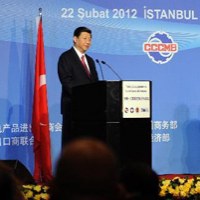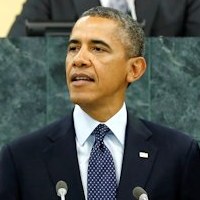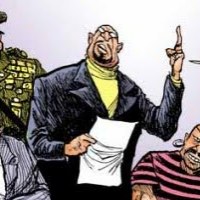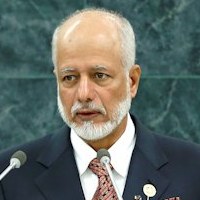![]()
STATEMENT
BY
H.E. GENERAL MICHEL SLEIMAN
PRESIDENT OF THE REPUBLIC OF LEBANON
AT THE SIXTY-EIGHTH SESSION
OF THE
UNITED NATIONS GENERAL ASSEMBLY
NEW YORK
TUESDAY, SEPTEMBER 24, 2013
Mr. President,
I would like to congratulate you on your election as the President of the current session of the General Assembly, and to express my appreciation to the Honorable Secretary-General of the United Nations, Mr. Ban Ki-moon, who has accompanied relentlessly and carefully the development of the general situation in Lebanon through his consecutive statements and reports about the implementation of the international resolutions regarding my country, mainly UNSC Resolution 1701 whose implementation is thankfully overseen by the UNIFIL, in coordination with the Lebanese Army.
Moreover, the Security Council’s last Presidential Statement on July 10 of this year, has set an effective roadmap for what can be done by the international community to help Lebanon, namely to preserve its stability, promote its institutions, support its economy and army, and help it face the growing burden of the incoming Refugees from Syria. This is the core objective of the meeting of the “International Support Group for Lebanon”, whose works shall be launched tomorrow afternoon, upon the invitation of His Excellency the Secretary-General.
Mr. President,
Many countries hereby represented have witnessed uprisings, civil wars or external aggression, and have long suffered from their repercussions. Nevertheless, most of them have managed, in variable periods of time, to overcome difficulties and reconstitute their national edifice.
As for the Lebanese, they belong to a long-standing civilization which was known, thousands of years ago, for creating the first advanced elements of the alphabet, and contributing to the constructive openness and communication across the Mediterranean between East and West, and among civilizations and cultures. With their capabilities and determination, those Lebanese will be able to assume the responsibility that lies upon their shoulders, in order to restore the glow of their country’s vocation as a space for freedom and conviviality, and to consolidate their existence in the East, within a State which has embraced democracy since its inception. and has been keen, since its independence, to respect diversity within unity and preserve personal and public freedoms.
Through dialogue, they will continue to work on developing their political system, improving their democratic practices, with the required consensus about a new modern electoral law and clarification of the governing mechanisms, and without neutralizing the essence of the consensual formula upon which Lebanon has risen, and which stipulates the equal and balanced participation of all the society’s components in running the public affairs. Article “J” of the Constitution’s preamble has even considered that “there shall be no constitutional legitimacy for any authority which contradicts the pact of mutual existence.” The Lebanese must also revert to their commitment to the “Baabda Declaration” which sets out Lebanon’s disassociation from the negative fallout of the regional crises and the policy of axes; as they will have to agree upon a national strategy to exclusively defend Lebanon in the face of Israel’s hostility and continuous threats, and to finalize the adoption of administrative and legal measures that would enable them to benefit from their resources and sovereign rights to Lebanon’s offshore gas and oil fields.
No matter how strong this commitment may be, the Lebanese still need the care and support of brotherly and friendly countries, in order to face the negative repercussions of the external conflicts and problems which are none of their making, but which still threaten their security and stability, and prejudice their socio-economic situation.
Not only do they look up to that assistance out of brotherly and friendly solidarity, but also based on the common responsibility thrust upon the international community as a whole, regarding the problems which pose a threat to regional and global security in general.
The major regional challenges that affect Lebanon negatively are:
The first challenge stems from the repercussions of the Syrian crisis on Lebanon’s security and economy. Despite the decision of disassociation agreed upon by the National Dialogue Committee through the “Baabda Declaration” which has become one of the United Nations’ official documents, some conflicting Lebanese parties have been involved in the ongoing conflict on the Syrian territories. The Lebanese territories were also under violations and aggressions from the Syrian side of the borders. This involvement has coincided with terrorist bombings against civilians, in particular in the Southern suburb of Beirut and in the capital of the North, Tripoli, claiming the lives of tens of civilians and causing harm to hundreds of people.
As for the most pressing and biggest burden, which has begun to take an existential dimension, it derives from an unprecedented increase in the numbers of incoming Refugees from Syria, way beyond Lebanon’s capacity of assimilation, exceeding one fourth of Lebanon’s population. As you know, Lebanon is a country with an exiguous geographical area, limited resources and capabilities, and sensitive balances.
As it is not possible to impose on nations — and individuals — the “impossible” and what they are not able to do, it is important for me to reiterate, from this very rostrum, my call for your States to support the proposals I have already put forth, in order to ease this escalating burden, mainly axed around the following points:
— To provide sufficient funds, human and financial resources, efficiently, in order to put frames and regulations about the presence of the incoming Syrian refugees, meet their basic humanitarian and livelihood needs, noting that pledges undertaken at the meeting of the Donor States and Organizations which was thankfully hosted by the State of Kuwait on the 30th of January 2013 were fulfilled only partially.
— To consolidate frameworks and spaces to lodge Syrian Refugees on Syrian territories, in safe zones outside the reach of the ongoing conflict, knowing that the area of Syria is eighteen times that of Lebanon.
— To agree on holding an international conference on the issue of Syrian Refugees, which does not merely call for financial assistance, but rather begins to search for ways to share the burdens and numbers among States, based on common responsibility and in light of historical precedents. Indeed, the enlarged meeting convened by the High Commissioner of the United ations High Commission for Refugees to be held in Geneva on the 30th of this month is but a positive move in this direction.
— To provide support from all the concerned and capable States for the works of the “International Support Group for Lebanon”, which has placed the issue of the Refugees at the top of its priority list;
All of this pending the sought political solution for the Syrian crisis, which would ensure a safe and dignified return of the Refugees to their country, as soon as possible.
As for the main challenge, it still derives from the repercussions of the Arab-Israeli conflict, the persistence of the Israeli occupation and oppressive practices, as well as Israel’s attempt to establish more illegal settlements, and Judaize the city of Jerusalem (Al-Qods), and the failure of the international community to find a just and comprehensive solution for all the aspects of this conflict, especially with the subsequent Refugee problem in the neighboring host countries, in particular Lebanon, the enhanced sense of injustice and tendency for extremism and violence, and the resulting human and material losses that have hindered the projects of economic and social progress throughout the Arab nation. Lebanon has specifically suffered from the consecutive Israeli attacks against its territories. facilities and infrastructure, with different types of lethal and prohibited weapons. It has paid a high price for these attacks and for the killing, abuse, division and destruction entailed by the subsequent years of occupation and aggression.
Therefore, in vIew of ensuring its national interests, fulfilling justice and peace, and implementing the objectives and binding resolutions of the United Nations Charter, Lebanon calls for the following:
- To keep working on imposing the implementation of all the provisions of UNSC Resolution 1701, in a manner that guarantees the consolidation of the foundations of stability and security in South Lebanon, and contributes to spreading State authority all over the territory and preventing Israel from its daily violations against the Lebanese sovereignty. On this occasion, I would like to thank all the countries participating in the UNIFIL, as well as the Force commander and troops, for their dedication and sacrifice in the service of the cause of stability and peace.
- To promote the endeavors aimed at finding a political agreed upon solution to the Syrian crisis, which would preserve Syria’s unity and the rights and fundamental freedoms of all its citizens and all the components of its population. Lebanon has already condemned the use of chemicals weapons, and it has called on the United Nations, including the Security Council, to assume solely the duty of holding the perpetrators accountable. The last American-Russian agreement about the weapons may be an introduction to the desired comprehensive peaceful solution. This solution would stop the bloodshed and prevent extremism from reaching out to neighboring countries, and seriously undermining international relations.I also avail myself of this opportunity, today, to condemn any aggression against holy sites in any part of the world, especially in the Middle East, the cradle of divine religions, and what the historical Syrian town of Maaloula has endured lately, for these attacks represent a violation of civilization and of the tolerant spirit of religions. This requires a firm stance by the international community about means to protect those sites, mainly to adopt a mechanism to assess the reality of the situation on the ground.
- To encourage the competing regional countries, outside the Arab-Israeli contlict, to let the logic of dialogue and negotiation prevail among them, and to find pacific and rational solutions to the problems that put them in confrontation with one another, in such a way that guarantees their common and legitimate interests, according to objective and fair norms. These solutions are possible and less expensive than those which rely on circumstantial and volatile balance of powers.
- To raise awareness among influential regional countries about the importance of distancing Lebanon from conflicts, and the uselessness of pushing it into the policy of axes with all the tension and divergence it creates between the sects and confessions; thus to encourage these countries to offer effective support to the provisions and goals of the “Baabda Declaration”, and to the approach of dialogue and consensus, just like the support that was pledged by the Security Council.
- To push in the direction of a just and comprehensive solution for the Middle East problem, at the heart of which the Cause of Palestine, pursuant to the resolutions of the international legitimacy, the terms of reference of the Madrid Conference, and the Arab Peace Initiative, while keeping in mind that there shall be no stability, democracy and moderation in the Middle East without justice in Palestine, based on the conviction that the security of the Arab region and the preservation of its cultural diversity take on a strategic importance.
As Lebanon follows with interest the resumption of the Israeli-Palestinian peace negotiations, it still calls for the adoption of comprehensive and complementary approaches which guarantee the participation of all the concerned States, and tackle all the aspects of the Arab-Israeli conflict, as a substitute for bilateral and unilateral solutions. Lebanon shall therefore remain vigilant and keen so that no solution shall be at the expense of its higher interests. It shall specifically deny any solution that may allow the settlement of Palestinian Refugees on its territories, which contradicts the provisions of executive article 4 of the Arab Peace Initiative, as well as the preamble of its Constitutions and the constants of its National Accord.
Mr. President,
In this transitional period where the Arab world is undergoing major historic transformations, the world as a whole is witnessing an essential transfonnation due to the amazing scientific progress coming up overnight, especially in the fields of communication and information.
This progress spreads a character of globalization on all walks of life as well as on the citizens’ daily affairs; it requires the generalization of the spirit of pluralism and diversity in various societies and entities, as an inherent condition to keep up with the accelerating wheel of change.
Nevertheless, the regimes that run the affairs of these peoples and societies have not undergone a corresponding progress in parallel at the intellectual level. On the contrary, there appeared some extremist, terrorist and isolationist trends which do not recognize the other, and refuse dialogue and coexistence. They have even driven some to claim the return to religious “emirates” and racist seclusion, and to resort for that to violent methods that defy peace and public freedoms. Amid these unilateral fundamentalist tendencies, Lebanon remains a laboratory and an example for the desired mode of coexistence for tomorrow’s world. This example needs to be suppol1ed and provided with the means to preserve its survival. lt has been witnessed by the Lebanese youth for tens of years, as students in the lobbies of schools and universities, as soldiers in the barracks of the army, security forces, military camps, and while undertaking national missions. It has also been practiced by the citizcns on the streets of the cities, the towns and the capital, in its theaters, clubs, cafes and movies, in public and private institutions and in the organizations of the civil society. This lifestyle is being practiced on a daily basis, at the sound of the churches’ bells and mosques’ minarets, side by side, and through joint occasions, notably the Common Religious National Day on the 25th of March of every year, the day of the Annunciation, noting that all these occasions seek the common good.
Ladies and Gentlemen,
Heads of States and International and Regional Organizations,
The management of diversity and the construction of a culture of peace and coexistence between cultures, civilizations and religions, require that we all work, as of now, on the following three Issues:
First: To improve the political, financial and social systems which cater for the affairs of people and States — especially the democratic system — to make them more humane and diversity-relevant, in such a way that guarantees the involvement of the human components in all countries (including minorities) in thc political life and in running the public affairs, regardless of their numeral ratios or capacity, but rather according to their capabilities and civilizational heritage.
Second: To consider the preservation of the free and active presence of minorities in the world, with the civilization and specificity they represent, an international responsibility, especially in the Middle East, the cradle of the divine religions whose populations have lived centuries of common life and built civilizations that enriched the history of mankind with culture and values of tolerance, good and love. This responsibility is not based upon on sharing international interests in this part of the world; it does not consider these groups from the perspective of these interests, but rather takes into account the interest of each of these minorities to uphold their nation’s causes by being a fundamental part of that nation’s fabric.
Third: To intensiry the ongoing endeavors aimed at reforming and developing the United Nations’ organs and specialized agencies, commensurate with the current progress, in order to restore confidence in its capacity to address international problems, counter crime, take the appropriate relevant resolutions and implement them without any hurdles, away from selectivity and doublestandards. This would be an alternative to the logic of legitimate force which may be used by the peoples whose countries are victims of aggression and occupation, in the absence of a capable and guarantor international reference.
On its part, Lebanon shall remall1 faithful to the message of freedom and conviviality that characterizes it, committed to the resolutions of the international legitimacy, keen on the spirit of moderation and accord upon which it had founded the essence of its entity. and an active partner in the comprehensive international endeavors seeking justice. peace, and sustainable human development.
Thank you.



 RSS
RSS











Latest Comments
... [Trackback] [...] Read More: crethiplethi.com/contact-form/trackback/ [...]...
Hello Mike, Thank you for your positive feedback to the article. I felt there wasn’t too much critical analysis of ...
Thanks for this considered and well constructed article. A follow up article on the manner in which the editorial contro...
THE CLUELESSNESS OF CLAIMING THAT OBAMA'S MIDDLE EAST POLICIES WERE A FAILURE CANNOT BE FURTHER FROM THE TRUTH, WHAT THE...
As long as Obama is the president of the usa do not trust the us government......